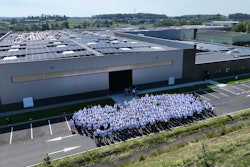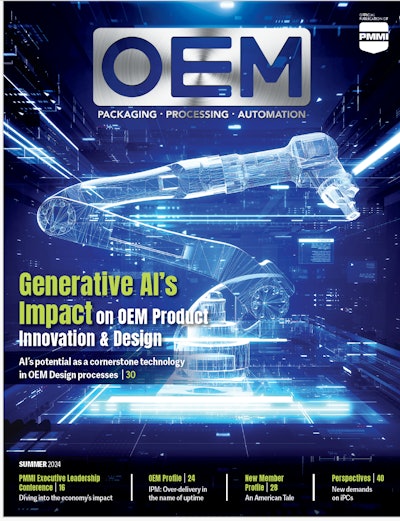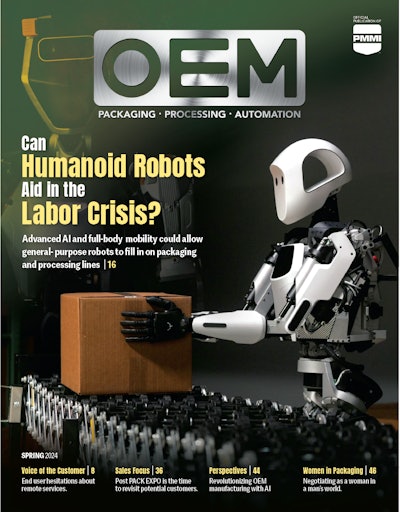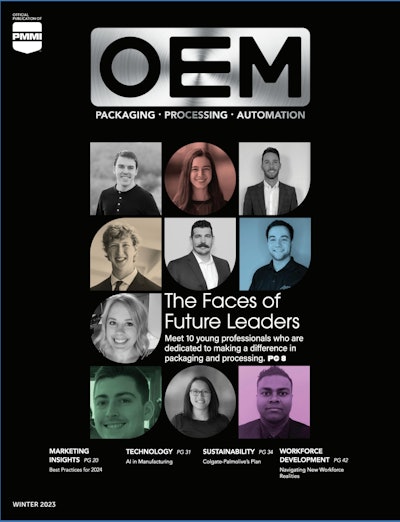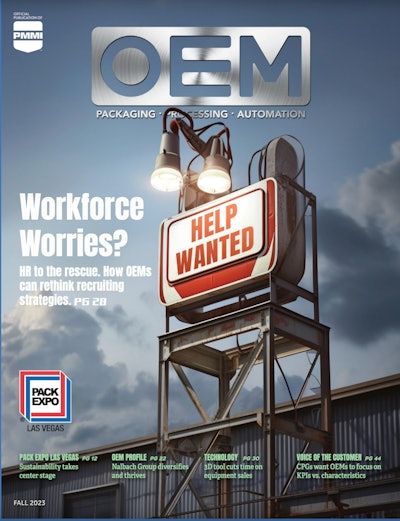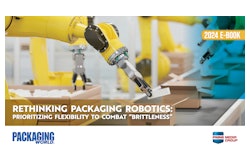
This Spring, PMMI held its Executive Leadership Conference (ELC). One of the highlights of the conference is the ITR Economic Outlook, which provides a roadmap for 2024 and beyond, both in packaging and processing and around the globe. After the ELC, OEM Magazine’s Editor-in-Chief Sean Riley sat down with Brian Beaulieu, CEO and Chief Economist of the Institute for Trend Research (ITR) Economics, for an unPACKed with PMMI podcast. The following is a portion of their discussion edited for space and clarity. The entire podcast is available at pmmi.org/podcasts.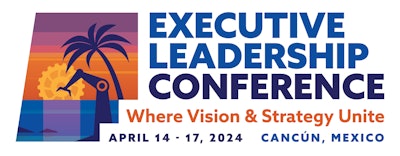
Sean Riley: You spoke at the Executive Leadership Conference, and right up front, you said that the economy is going to skate by in ‘24, but then you have 25 through 28 as good years that are looking up. What exactly is going to happen there?
Brian Beaulieu: It's tough to talk about what exactly will happen there, but the general trend is that the economy will improve in ‘25, ‘26, ‘27, ‘28 because we don't see any major stumbling blocks. In my world, we look for economic imbalances and don't see any imbalances.
We see consumer incomes continuing to go up. The trouble spots, like deficit spending, are future problems. They're not likely to impact us in that short period. The Fed looks like they're done with quantitative tightening. I'm not sure they're going to go into quantitative easing, but the tightening portion is behind, which is how we're reading the trends.
Sean Riley: I was thinking about how packaging and processing can prepare for that or make the most of that little uptick before what ITR is projecting to be a massive downtick once we hit the 2030s.
Brian Beaulieu: One of the things that everybody needs to do is figure out how they can obviate labor in economic speak, which is how we can employ technology, not only on the processing floor or distribution floor but in information systems and information flows in the office. AI is just a small part of it. It's not just AI, but the more I can get automation to replace people, the stronger I am going to be going forward because people are going to be the single most expensive and limited in supply element to what we do.
Sean Riley: You noted an interesting trend: as you said, manufacturing is paying almost too high or very high wages. On the other hand, manufacturing is having a very hard time getting labor. How do you balance those two elements where they need to pay these higher wages to retain labor, but they can't find any labor to begin with?
Brian Beaulieu: A lot of it can be circumvented by having some sort of career path available to people, even on the manufacturing floor. If you can show them, they'll learn these skills, which will get them into the higher wages. Then, at least, you're matching what they can do with the higher wages instead of just throwing money at a very serious problem. Culture has a lot to do with retaining people, and the geographic market you're talking about also does. So there's no one fix, but culture is extremely important.
I believe affordable housing in the area where you're manufacturing is absolutely important. And there are some political things you can do there. Some of the folks I know are even investing in that. They are investing in housing infrastructure along with the cities or the towns to make some things happen in that regard.
Those aren't things that we used to have to contend with in the 1970s, 1980s, and 1990s. This is just a whole new paradigm.
Sean Riley: That's very interesting. I hadn't thought of housing and things like that as part of the whole package.
Brian Beaulieu: I tell you what some other successful companies are doing as a best practice: they're subsidizing childcare right near their facilities. Moms and dads can bring their kids, work their shift and then pick up the kids and go home. They're also subsidizing healthcare facilities with physician assistants (PA) and nursing assistants near the facility just to make it a lot easier to come to work for me as opposed to this other person.
Sean Riley: We have an election coming up. How will the results impact the economy?
Brian Beaulieu: It's a very interesting question, to be sure. Let me step back and tell you we're numbers-based. The numbers are the numbers. When I look back, we look back at Republicans versus Democrats over the years in post-World War II history, who was in the Oval Office.
You couldn't say under blue or under red that you will have slower or faster growth. Let's fast-forward to after Bill Clinton, the second George Bush when he was in office. The average GDP growth parameter was 1.9%. You go to President Obama, and it was 2.0%, and you go to Donald Trump, and it was 1.8%.
These are very different administrations, different focuses, and different social ideas. Yet the rate of growth in the economy was very stable. And that's the point. These politicians will change where we spend money. They will change who is going to be the beneficiary of the money. So it's really how much deficit spending they are willing to engage in that moves the needle in terms of economic growth.
However, understand that moving that needle in the short term gets you reelected, but it harms the economy in the long term. They can change their policies, but those are social policies that don't change the economic outcome at the end of the day.
Sean Riley: You said when speaking at the ELC that China is going to be a problem in the near future.
Why, and what is the problem going to be there?
Brian Beaulieu: The problem is really twofold. First, their demographics are in a negative trend. Their population is getting smaller, and that is an exceedingly difficult situation for an economy to find itself in. It makes growth very difficult.
The second issue is that their whole economy has been propped up based on leverage since about 2012. And that's not a stable platform—it's a house of cards. And you're seeing that leverage just collapsing. When you look at the housing market and another big developer has gone under, you look at how much money state-owned enterprises owe that will never get paid back.
It's just a treadmill that is totally unsustainable. When you have fewer and fewer consumers in your economy, that leverage only becomes more and more burdensome, which is why their government has to become more dictatorial. I know that's a politically sensitive term, but they’re pulling back in finding ways to become capitalists in their economy. It's becoming increasingly state-run and state-determined because the government needs to exert more command and control, and the economy is fraying rapidly around the edges.
Sean Riley: We hear all the time, and I don't know if it's a media thing, but we hear all the time that the U.S. Economy is struggling. But you seem to say, and you've stuck to this, that it's going to remain the dominant, largest economy in the world for the next 50 to 100 years. Why is it always perceived as negative?
Brian Beaulieu: It is a political exercise. I'm not a politician, but I've studied politics and reassociation with economics, among other things. And if the politicians can create pain in your mind, then they can position themselves as the solution to that pain or that problem. And that's why you're going to vote for them. Americans vote for people who say, I can fix this problem for you. Not, let's work together because we're the best there is.
Sean Riley: With that in mind from a positive standpoint then, you're stating that the economy is going to remain the largest in the world going forward, correct?
Brian Beaulieu: Correct. For three very good reasons. One, our demographic trend is positive—it could be even better, obviously—but it is positive. Second, we have been mightily blessed with natural resources here in the United States. Our geography is amazing. Third, we still have the rule of law. The simplest way to express that is that we have intellectual property rights, private property rights, and bankruptcy laws that allow us to fail, get back on our feet and try again. There's no place on this planet outside of the United States where you're going to find all three of those factors in existence at the same time in the same geography. This is a unique American experience.
Sean Riley: I know this is the elephant in the room we've been discussing for a little while, as you've given presentations at various PMMI events. ITR has highlighted a depression that's coming in the 2030s. It's not going to be pretty. So, is there anything that we can do to avoid it? I think I know the answer to that. And what can companies do to prepare for it?
Brian Beaulieu: You can always do something if we mean the government, but they're not going to because that would not get them reelected. That's not going to happen. I think we can safely rule that one out.
So, I'm going to focus more on businesses and individuals. Businesses need to start figuring out, and we help them with this, what markets will be relatively safe during the 2030s and what markets will be absolutely clobbered. It doesn't matter if I'm not currently involved with the relatively safe ones; I have five or six years to get something going and start gaining market share in those relatively safe areas. And really downplay the areas that we think are going to get hurt and hurt. You can rebalance your company. You still have time to do that.
The larger the company, the more difficult that is. Although I guess if you get really large, you can always make an acquisition into a safer space. We described it at the [ELC] as a financial bunker program. Get these things about your life in order before we hit the 2030s. And my goodness, talk to your kids about what they're studying and what career paths they should be thinking about if they're graduating anytime near the 30s or in the 2030s. Because that's critically important to their long-term well-being.
The whole reason we do this is not to scare people but to forewarn them. If you're forewarned, you're forearmed. More people become millionaires during bad times than during good times. And those who become millionaires are the ones who can see what's happening, change their course, and use the trends to their advantage.





